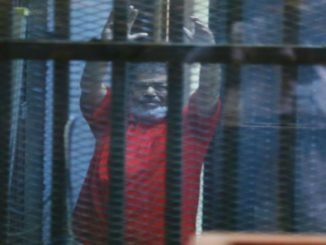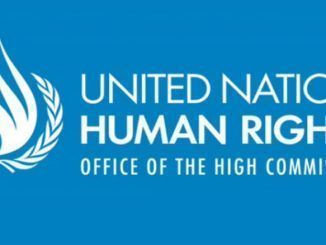
Hopes for freedom and democracy brought by January Revolution in 2011 have faded away after the military coup led by the former General Abdel Fattah al-Sisi in 2013.
As any autocratic regime, al-Sisi government tends to eliminate all forms of democracy and freedom of speech in the country. Egypt’s new policies and tactics now are similar in autocratic regimes which aim to secure their leadership from any possible opposition that would widen the scale of dissent in their countries and thus, challenge their power. They usually seek to turn their societies into secretive and closed public domains, said Daily News Egypt in a report it published on Monday.
Al-Sisi is putting himself in the same shoes of other autocratic regimes as North Korean President Kim Jong-Un who has successfully limited his country’s access to the global internet. Other than the limited access granted to the government, there is virtually no network available to locals. As a result, the society in North Korea has turned to an isolated, secretive society after the crackdown of the North Korean authority on the internet.
In fact, the Egyptian military regime controls the media and the parliament through former intelligence and security figures who have become members of the parliament to pass laws in the regime’s favor. In the same context, the government launched a massive crackdown to silence the opposition in the country.
In this context, Tamer Al-Shehawy, a former general who turned to a parliament member, presented a cybercrime bill in early May. Al-Shehawy’s bill claims that its target is to support counter-terrorism efforts and eliminate the ‘forces of evil’ on the internet.
Al-Sisi has referred several times in his speeches to the “Forces of evil “or “Evil doers” which indicates how the Egyptian parliament is working in alignment with the military regime in Egypt to stabilize its rule.
Al-Shehawy is a member of the parliament’s Defense and National Security Committee and he was a former major general and officer in the military intelligence.
The Suggestions and Complaints Committee in the House of Representatives bill has approved the suggested bill that consists of 30 clauses, most of which are punitive not regulatory, according to the leaked version and to Al-Shehawy. The house has yet to vote on the bill in a general session.
The bill imposes penalties that range from heavy fines to prison sentences to the death penalty which has raised concern among civil society members and human rights activists fearing that parliament will vote to pass it.
The main aim of legalizing the cybercrime bill is to explicitly criminalize acts on the internet in a separate law from the penal code as stated by the Al-Shehawy. He also said that the crimes included in his bill have no reference in Egypt’s penal code. “New crimes need new laws to counter them,” he argued.
He justified his stance by saying that the threats Egypt is currently facing have changed, thus requiring new strategies and laws in dealing with them.
Al-Shehawy also claimed that this bill would criminalize wrongful acts and impose penalties, but does not seek to be regulatory of internet behavior, which should be done by the Communications Committee.
Al-Shehawy said, “There are indeed some terminologies that need to be explained in the law in order not to be wrongfully used, and the bill shall be amended because it is not holy and may include imprecise terms.”
In response, human rights activists expressed their dissent and fear from the new cybercrime bill if passed by the parliament.
The vice-president of the National Council for Human Rights (NCHR) Abdel Ghaffar Shokr said that the government is trying its best to control society and to close the public domain, the last outlet of which is of course the internet.
Shokr said, “The authorities are not going to stop unless they fully suppress everyone and everything. There will be no exit left for anyone to express their opinions if this bill is approved.”
Mohammed Al-Taher, a researcher at the Association for Free Thought and Expression (AFTE) said “The worst thing about the bill is the support for blocking and surveillance. Blocking never had a law, and surveillance will be carried out by communications companies under the umbrella of the law and will save information for up to six months.”
Another major problem in the bill is that it has different sentences for the same crime. If a crime that is considered contempt of religion is committed in the street, the penalty for it would be five years in prison, but if it is committed on the internet, then the sentence would be for life.
Al-Taher said, “There is no need for a cybercrime law in the first place, as it is like any other crime but the difference is that it is committed on/using the internet,” adding that internet activists may be arrested with or without this law so it does not even act as a proper legal framework.
Al-Taher added that the real problem is the hostile nature of the state against the internet. This was especially apparent in recent speeches given by Al-Sisi, which he views the internet as an invention that the ‘forces of evil’ try to wield in their favor. Al-Sisi has once stated in his speech in April 2016, “I can easily occupy the internet with two troops and make it a closed circuit for media figures to take their news from it.”
Authorities have realized that there is no way to completely control the internet; however, instilling fear in the populace, which is the main aim of the law, works in the government’s favor, said Al-Taher.
In fact, the internet opened up as the only space through which people could express their views especially with the wide suppression of the Egyptian authorities against the opposition. Moreover, the Egyptian regime controls media as the government either quashed all voices of dissent or self-censorship is a common practice in order to not be targeted by the state security forces. If the internet becomes the next medium for control, the target would not only be journalists and opposition, it could be any citizen.
In addition, article 17 in the proposed cybercrime bill reads that “publishing phrases, numbers, pictures, films, or any promotional material that may threaten national security may be blocked…”
Taher said that this article is very dangerous as It would possibly give authority to completely block information, because the term “national security” is very ambiguous and vague. There have been eight recorded cases of individuals being charged with threatening national security, tied to their actions on the internet.
Moreover, the bill includes crimes with severe penalties, and it also stipulates that all mentioned crimes in the bill, if committed, may lead to a life sentence in prison, with all the ambiguity and vagueness, Al-Taher added.
Even there is crackdown on information circulation lies in the ‘sharing’ process. If this law were to be implemented, anyone who shares information leaks can be arrested. “This law was mainly drafted and suggested because of the major fear of information sharing,” said Al-Taher.
According to Al-Taher, if a user extracts secret or classified information from the internet, even if it is not their intention, they could face arrest.
If the email of an internet user is breached, and the breach was not reported within 24 hours and the hacker used the email for illegal acts, then the breached user may be subject to arrest and could face a EGP 50,000 fine and a minimum prison sentence of 6 months.
“The problem is that they are dealing with the users as if they are technical experts and know how to secure their accounts,” Al-Taher said, adding that the same applies to bloggers and website owners.
In the same context, Human rights organizations criticized the bill and said it is an attempt to harass all of those who dissent or express opinions on social media.
The Egyptian Initiative for Personal Rights (EIPR) and AFTE, have called the Egyptian parliament to reject the suggested bill.
A report that was released by a number of NGOs earlier this month claimed that the drafting of the bill was poor given the severity of the sentences and it addressing what is intended to be a criminal law.
Several articles in the bill was criticized by the bill saying that it was drafted to be as the 2001 Budapest convention, an agreement that was heavily criticized by the international community for its vagueness and dangerous consequences to freedoms.
It would be more rational to amend the current Penal Code that already exists instead of drafting a new law that is full of substantial mistakes, the NGO report concluded.
The head of the Arabic Network for Human Rights Information (ANHRI), Gamal Eid, said in a press statement that the government has not learned its lesson and still insists on antagonizing the youth, even after they have proved that they fear neither imprisonment nor oppressive regimes.
It seems that all autocratic regimes are similar; they seek to close all the forms of expression that might challenge or impose any threat on their power. It seems that al-Sisi fears the same fate of Egypt’s ousted dictator Hosni Mubarak who ruled Egypt for 30 years. The internet has played a major role on 25 January Revolution, which toppled Mubarak.



